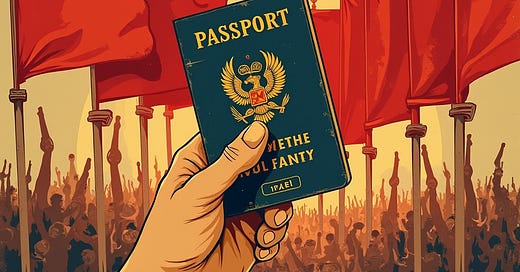Tub-thumping on passport selling on 1 May? I wouldn’t be surprised…
Pragmatism cannot be selective. If we justify economic exceptions to survive within the European economic order, we must also make moral exceptions to ensure dignity and inclusion for all workers
I have no doubt Malta’s ruling centre-left party will use its annual 1 May rally to defend an elitist citizenship-by-investment programme that gives the ultra-rich EU citizenship for just over €1 million that has been lambasted by the ECJ. Ironic of course.
The upshot will be that the billion-euro posterity fund created by the sale of golden passports, benefits the entire citizenry with social projects, public infrastructure, and theoretically secures our economic future. It’s a fair argument that provides partisan voters dog-whistle messaging.
And yet, it is surely not the kind of clarion call suitable on a day where we should be championing trade-unionisim and the New Green Deal, fighting unfair profiteering and calling for an end to the genocide in Palestine.
I have traditionally been critical of the Maltese CBI programme but those who ideologically despise it have never questioned other sanitised, questionable schemes such as tax refunds for foreign profits booked in Malta. I have since refined my stance, questioning my own ideological opposition to the CBI programme due to the assymetrical economic relations that dominate international trade and politics.
My real gripe is however this: Malta offers no fair or humane pathway to citizenship for asylum seekers and long-settled non-EU residents. These are people who have lived here for years, who work, pay taxes, raise children born and bred in Malta – children who speak Maltese, support our football teams, and call this island home. Yet, they remain locked out of the system, treated as second-class residents in the only home they’ve ever known. Only one party, Momentum, has called out this imbalance.
This is the transactionalism of citizenship that bothers me. If we’re prepared to sell passports to billionaires, surely we can offer a dignified, structured path to citizenship for people who are part of our communities and contribute to our society in tangible, meaningful ways.
I also believe in a rules-based society: as long as a CBI is fully transparent and scrutinable in the House of Representatives, it is another Maltese FDI scheme – money talks for ‘first-class’ migrants much as it does for any ‘first class’ multinational setting up base in Malta for tax reasons or subsidised landing fees and other state-mandated economic benefits…. These are economic tools, plain and simple.
Speak to any diplomat and you’ll find that states, whether EU or UN members, will always protect their national interest first. And when you’re a microstate at the periphery of Europe, heavily dependent on imports and vulnerable to economic shifts decided in Brussels, Frankfurt, or Paris, you make do with what leverage you can. For us, that leverage includes corporate services, VAT schemes, and yes, CBI.
Pragmatism cannot be selective. If we justify economic exceptions to survive within the European economic order, we must also make moral exceptions to ensure dignity and inclusion for the people who already live and belong here.
Legal upshot of the ECJ decision
Transactional citizenship breaches EU Law: The ECJ found that Malta’s CBI enables naturalisation without a real connection, which violates the spirit and letter of EU law.
The scheme risks undermining the status of EU citizenship, which must remain tied to a genuine national bond. (Article 20 TFEU)
Malta was found to have violated the principle of sincere cooperation by failing to safeguard the integrity of EU citizenship and mutual trust among Member States. Breach of Article 4(3) TEU.
The Court explicitly condemned the practice of treating EU citizenship as a commodity, stating this is incompatible with the values of the Union.
Final CJEU EC v Mala Judgment TextEuropean Commission Press Release (Background)




